Commandant of the Marine Corps may refer to:
Commandant of the Marine Corps may refer to:

The commandant of the Marine Corps (CMC) is normally the highest-ranking officer in the United States Marine Corps. It is a four-star general position and a member of the Joint Chiefs of Staff. The CMC reports directly to the secretary of the Navy and is responsible for ensuring the organization, policy, plans, and programs for the Marine Corps as well as advising the president, the secretary of defense, the National Security Council, the Homeland Security Council, and the secretary of the Navy on matters involving the Marine Corps. Under the authority of the secretary of the Navy, the CMC designates Marine personnel and resources to the commanders of unified combatant commands. The commandant performs all other functions prescribed in Section 8043 in Title 10 of the United States Code or delegates those duties and responsibilities to other officers in his administration in his name. As with the other joint chiefs, the commandant is an administrative position and has no operational command authority over United States Marine Corps forces.

Michael William Hagee is a retired United States Marine Corps four-star general who served as the 33rd Commandant of the Marine Corps from 2003 to 2006, succeeding General James L. Jones on January 13, 2003. He stepped down as Commandant two months before the end of his four-year term, and was succeeded by General James T. Conway on November 13, 2006. On that date, Hagee had his retirement ceremony just prior to the passage of command ceremony. Hagee retired from the Marine Corps on January 1, 2007.
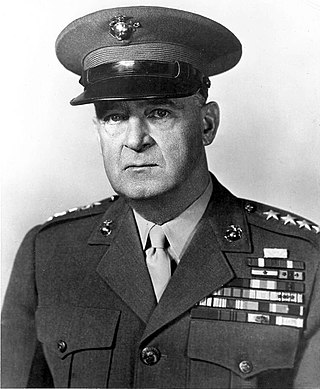
Alexander Archer Vandegrift, was a U.S. Marine Corps four-star general. During World War II, he commanded the 1st Marine Division to victory in its first ground offensive of the war, the Battle of Guadalcanal. For his actions from August 7 to December 9, 1942, during the Solomon Islands campaign, he received the Medal of Honor. Vandegrift later served as the 18th Commandant of the Marine Corps. He was the first four-star general on active duty in the Marine Corps.

Carl Epting Mundy Jr. was a United States Marine Corps four-star general who served as the 30th Commandant of the Marine Corps and a member of the Joint Chiefs of Staff from July 1, 1991, until his retirement on June 30, 1995, after 42 years of service. He was notable for his opposition to military service by gay people and for helping to shape the military's "don't ask, don't tell" policy of 1993.

Lemuel Cornick Shepherd Jr. was a General in the United States Marine Corps, 20th Commandant of the Marine Corps, Navy Cross recipient, veteran of World War I, World War II, and the Korean War.

The Commandant General Royal Marines is the professional head of the Royal Marines. The title has existed since 1943. The role is held by a General who is assisted by a Deputy Commandant General, with the rank of brigadier. This position is not to be confused with Captain General Royal Marines, the ceremonial head. The Commandant General Royal Marines is the counterpart to the Commandant of the United States Marine Corps.
Colonel commandant is a military title used in the armed forces of some English-speaking countries. The title, not a substantive military rank, could denote a senior colonel with authority over fellow colonels. Today, the holder often has an honorary role outside the executive military structure, such as advocacy for the troops.
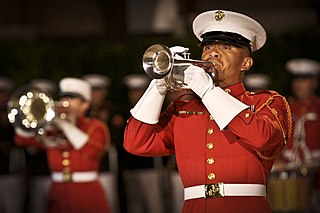
The United States Marine Drum & Bugle Corps is the drum and bugle corps of the United States Marine Corps. The D&B is now the only full-time active duty drum corps in the United States Armed Forces. As one of many United States military bands, the United States Marine Drum & Bugle Corps consists of 80 active-duty Marines dressed in ceremonial red and white uniforms. The D&B performs martial and popular music.
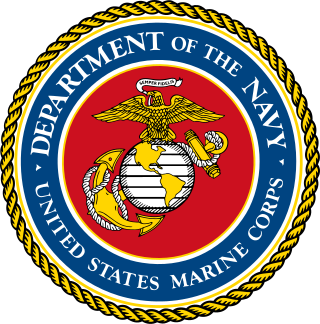
Headquarters Marine Corps (HQMC) is a headquarters staff within the Department of the Navy which includes the offices of the Commandant of the Marine Corps, the Assistant Commandant of the Marine Corps and various staff functions. The function, composition, and general duties of HQMC are defined in Title 10 of the United States Code, Subtitle C, Part I, Chapter 506.
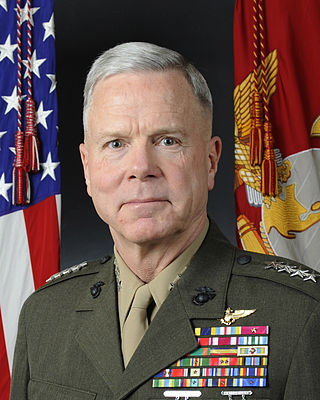
James F. "Jim" Amos is a retired United States Marine Corps four-star general who served as the 35th commandant of the Marine Corps. As a naval aviator, Amos commanded the 3rd Marine Aircraft Wing during the Iraq War in 2003 and 2006. He served as the 31st assistant commandant of the Marine Corps from 2008 to 2010, and was the first Marine Corps aviator to serve as commandant.

The assistant commandant of the Marine Corps (ACMC) is the second highest-ranking officer in the United States Marine Corps, and serves as a deputy for the commandant of the Marine Corps (CMC). Before 1946, the title was known as the assistant to the commandant.

The United States Marine Corps (USMC), also referred to as the United States Marines, is the maritime land force service branch of the United States Armed Forces responsible for conducting expeditionary and amphibious operations through combined arms, implementing its own infantry, artillery, aerial, and special operations forces. The U.S. Marine Corps is one of the eight uniformed services of the United States.

Joseph Francis Dunford Jr. is a retired United States Marine Corps four-star general who served as the nineteenth chairman of the Joint Chiefs of Staff from October 1, 2015 to September 30, 2019. He was the thirty-sixth commandant of the Marine Corps. Dunford is the first Marine Corps officer to serve in four different four-star positions; the others include commander of the International Security Assistance Force and United States Forces – Afghanistan from February 2013 to August 2014, and as the thirty-second assistant commandant of the Marine Corps from October 23, 2010 to December 15, 2012. He has commanded several units, including the 5th Marine Regiment during the 2003 invasion of Iraq.
The Military Secretary to the Commandant of the Marine Corps is the senior advisor and task manager for the Commandant of the Marine Corps. Personally selected by the Commandant, the Military Secretary is an active duty colonel who reports directly to the Commandant. The exact duties of the Military Secretary have varied based on the needs and preferences of each Commandant. There are no existing manuals or orders that dictate the exact role of the Military Secretary. They run the day-to-day operations of the Office of the Commandant, supervises the schedule of the Commandant, and performs other duties as the Commandant may direct. In order to perform the multi-faceted duties of the Military Secretary, the Marine must be well versed in all aspects of the United States Marine Corps, the United States Department of Defense, and the United States Government.
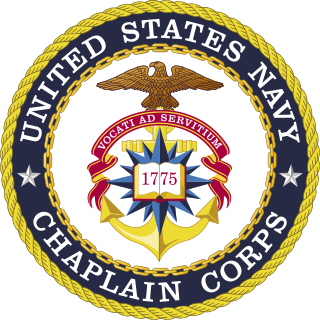
The Chaplain of the United States Marine Corps (CHMC) is a position always filled by the officers serving as Deputy Chief of Chaplains of the United States Navy as a "dual hatted" billet since 2000. The CHMC oversees religious ministry in the Marine Corps which one Commandant of the Marine Corps defined as "a vital function which enhances the personal, family, and community readiness of our Marines, sailors, and their families. Chaplaincy supports the foundational principle of free exercise of religion and helps to enrich the spiritual, moral and ethical fabric of the military."

David Hilberry Berger is a retired United States Marine Corps general who served as the 38th commandant of the Marine Corps from 2019 to 2023.

Eric M. Smith is a United States Marine Corps general who serves as the 36th assistant commandant of the Marine Corps since 8 October 2021, and as acting commandant of the Marine Corps since 10 July 2023. He most recently served as the deputy commandant for Combat Development and Integration, being succeeded by Karsten Heckl.
The Marine Corps Cyber Auxiliary is a volunteer organization designed to attract cybersecurity experts in aiding United States Marine Corps cyberspace readiness.